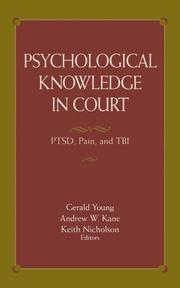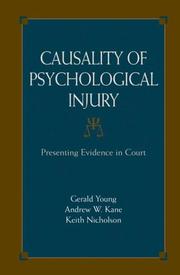| Listing 1 - 7 of 7 |
Sort by
|

ISBN: 128061353X 9786610613533 0387256105 0387256091 1441938125 Year: 2006 Publisher: New York : Springer,
Abstract | Keywords | Export | Availability | Bookmark
 Loading...
Loading...Choose an application
- Reference Manager
- EndNote
- RefWorks (Direct export to RefWorks)
PTSD, pain syndromes, traumatic brain injury: these three areas are common features of personal injury cases, often forming the cornerstone of expert testimony. Yet their complex interplay in an individual can make evaluation—and explaining the results in court—extremely difficult. Psychological Knowledge in Court focuses on this triad separately and in combination, creating a unique guide to forensic evaluations that fulfills both legal and clinical standards. Its meticulous review of the literature identifies and provides clear guidelines for addressing core issues in causality, chronicity, and assessment, such as: - Are there any definable risk factors for PTSD? - How prevalent is PTSD after trauma? - How do patients’ emotions relate to their pain experience? - Are current pain assessment methods accurate enough? - What is the role of pre-existing vulnerabilities in traumatic brain injury? - What exactly is "mild" TBI?
Forensic psychology. --- Juridical psychology --- Juristic psychology --- Legal psychology --- Psychology, Forensic --- Forensic sciences --- Psychology, Applied --- Law --- Law and Psychology. --- Psychological aspects. --- Psychology, Juridical --- Psychology, Juristic --- Psychology, Legal --- Therapeutic jurisprudence --- Psychology --- Psychology. --- Behavioral sciences --- Mental philosophy --- Mind --- Science, Mental --- Human biology --- Philosophy --- Soul --- Mental health
Digital
ISBN: 9780387256108 Year: 2006 Publisher: Boston, MA Springer Science+Business Media, Inc
Abstract | Keywords | Export | Availability | Bookmark
 Loading...
Loading...Choose an application
- Reference Manager
- EndNote
- RefWorks (Direct export to RefWorks)
Psychology and law --- psychologie --- recht --- pijn
Digital
ISBN: 9780387364452 Year: 2007 Publisher: Boston, MA Springer Science+Business Media, LLC
Abstract | Keywords | Export | Availability | Bookmark
 Loading...
Loading...Choose an application
- Reference Manager
- EndNote
- RefWorks (Direct export to RefWorks)
Psychology and law --- Criminology. Victimology --- Law --- Psychiatry --- psychologie --- recht --- criminologie --- klinische psychologie
Book
ISBN: 0190261595 1283232367 9786613232366 0199908109 9780199908103 9781283232364 9780190261597 661323236X 9780195326079 0195326075 Year: 2011 Publisher: Oxford ; New York : Oxford University Press,
Abstract | Keywords | Export | Availability | Bookmark
 Loading...
Loading...Choose an application
- Reference Manager
- EndNote
- RefWorks (Direct export to RefWorks)
Forensic mental health assessment (FMHA) has grown into a specialization informed by research and professional guidelines. This series presents up-to-date information on the most important and frequently conducted forms of FMHA. The 19 topical volumes address best approaches to practice for particular types of evaluation in the criminal, civil, and juvenile/family areas. Each volume contains a thorough discussion of the relevant legal and psychological concepts, followed by a step-by-step description of the assessment process from preparing for the evaluation to writing the report and testifyi
Personal injuries --- Evidence, Expert --- Forensic psychology --- Trial practice.

ISBN: 1280901403 9786610901401 0387364455 0387364358 1441942149 Year: 2007 Publisher: New York : Springer,
Abstract | Keywords | Export | Availability | Bookmark
 Loading...
Loading...Choose an application
- Reference Manager
- EndNote
- RefWorks (Direct export to RefWorks)
This sequel to the authors’ Psychological Knowledge in Court offers a welcome expansion on key concepts, terms, and issues in causality, bringing much needed clarity to psychological injury assessments and the legal contexts that employ them. Focusing on PTSD, traumatic brain injury, and chronic pain (and grounding readers in salient U.S. and Canadian case law), Causality sets out a multifactorial causality framework to facilitate admissibility of psychological evidence in court. Issues concerning malingering are examined in depth, as are clinical gray areas that can jeopardize validity. At the same time, the book clearly explains what lawyers and clinicians need to understand about each other’s work—of crucial importance since the two sides often seem to speak at cross-purposes. The authors and six guest contributors Illustrate the roles of preexisting vulnerabilities, traumatic events, and post-event occurrences in psychological impairment and disability Review the literature on PTSD, TBI, and chronic pain for legal relevance Identify current challenges and controversies in the field, as well as emerging areas for research Recommend methods and instruments for conducting more courtworthy assessments Provide a detailed critical review of malingering and related phenomena Propose a more accurate, shared terminology of causality Valid causality judgments are based on sound knowledge of research on large populations and careful testing of individuals; at the same time they must conform to stringent legal standards of relevance and reliability to be accepted for testimony. Forensic practitioners and attorneys will turn to Causality of Psychological Injury as their professional paths increasingly cross in seeking comprehensive and state of the art information.
Forensic psychology. --- Evidence, Expert. --- Liability for emotional distress. --- Expert evidence --- Expert testimony --- Expert witness --- Expert witnesses --- Opinion evidence --- Scientific evidence (Law) --- Evidence (Law) --- Witnesses --- Juridical psychology --- Juristic psychology --- Legal psychology --- Psychology, Forensic --- Forensic sciences --- Psychology, Applied --- Emotional distress, Liability for --- Liability for emotional distress --- Liability for mental anguish --- Liability for mental injuries --- Liability for nervous shock injuries --- Liability for psychiatric injuries --- Liability for psychic injuries --- Liability for psychic trauma --- Liability for psychological injuries --- Mental anguish, Liability for --- Mental injuries, Liability for --- Nervous shock injuries, Liability for --- Psychiatric injuries, Liability for --- Psychic injuries, Liability for --- Psychic trauma, Liability for --- Psychological injuries, Liability for --- Personal injuries --- Law and legislation --- Law --- Psychology, clinical. --- Law. --- Criminology. --- Law and Psychology. --- Clinical Psychology. --- Law, general. --- Criminology and Criminal Justice, general. --- Psychological aspects. --- Clinical psychology. --- Crime --- Social sciences --- Criminals --- Acts, Legislative --- Enactments, Legislative --- Laws (Statutes) --- Legislative acts --- Legislative enactments --- Jurisprudence --- Legislation --- Psychology, Juridical --- Psychology, Juristic --- Psychology, Legal --- Therapeutic jurisprudence --- Psychiatry --- Psychological tests --- Study and teaching --- Psychology --- Psychology. --- Behavioral sciences --- Mental philosophy --- Mind --- Science, Mental --- Human biology --- Philosophy --- Soul --- Mental health
Book
ISBN: 9780387256108 Year: 2006 Publisher: Boston, MA Springer Science+Business Media, Inc.
Abstract | Keywords | Export | Availability | Bookmark
 Loading...
Loading...Choose an application
- Reference Manager
- EndNote
- RefWorks (Direct export to RefWorks)
PTSD, pain syndromes, traumatic brain injury: these three areas are common features of personal injury cases, often forming the cornerstone of expert testimony. Yet their complex interplay in an individual can make evaluation and explaining the results in court extremely difficult. Psychological Knowledge in Court focuses on this triad separately and in combination, creating a unique guide to forensic evaluations that fulfills both legal and clinical standards. Its meticulous review of the literature identifies and provides clear guidelines for addressing core issues in causality, chronicity, and assessment, such as: - Are there any definable risk factors for PTSD? - How prevalent is PTSD after trauma? - How do patients' emotions relate to their pain experience? - Are current pain assessment methods accurate enough? - What is the role of pre-existing vulnerabilities in traumatic brain injury? - What exactly is "mild" TBI?
Psychology and law --- psychologie --- recht --- pijn
Book
ISBN: 9780387364452 Year: 2007 Publisher: Boston, MA Springer Science+Business Media, LLC
Abstract | Keywords | Export | Availability | Bookmark
 Loading...
Loading...Choose an application
- Reference Manager
- EndNote
- RefWorks (Direct export to RefWorks)
This sequel to the authors' Psychological Knowledge in Court offers a welcome expansion on key concepts, terms, and issues in causality, bringing much needed clarity to psychological injury assessments and the legal contexts that employ them. Focusing on PTSD, traumatic brain injury, and chronic pain (and grounding readers in salient U.S. and Canadian case law), Causality sets out a multifactorial causality framework to facilitate admissibility of psychological evidence in court. Issues concerning malingering are examined in depth, as are clinical gray areas that can jeopardize validity. At the same time, the book clearly explains what lawyers and clinicians need to understand about each other's work of crucial importance since the two sides often seem to speak at cross-purposes. The authors and six guest contributors Illustrate the roles of preexisting vulnerabilities, traumatic events, and post-event occurrences in psychological impairment and disability Review the literature on PTSD, TBI, and chronic pain for legal relevance Identify current challenges and controversies in the field, as well as emerging areas for research Recommend methods and instruments for conducting more courtworthy assessments Provide a detailed critical review of malingering and related phenomena Propose a more accurate, shared terminology of causality Valid causality judgments are based on sound knowledge of research on large populations and careful testing of individuals; at the same time they must conform to stringent legal standards of relevance and reliability to be accepted for testimony. Forensic practitioners and attorneys will turn to Causality of Psychological Injury as their professional paths increasingly cross in seeking comprehensive and state of the art information.
Psychology and law --- Criminology. Victimology --- Law --- Psychiatry --- psychologie --- recht --- criminologie --- klinische psychologie
| Listing 1 - 7 of 7 |
Sort by
|

 Search
Search Feedback
Feedback About UniCat
About UniCat  Help
Help News
News